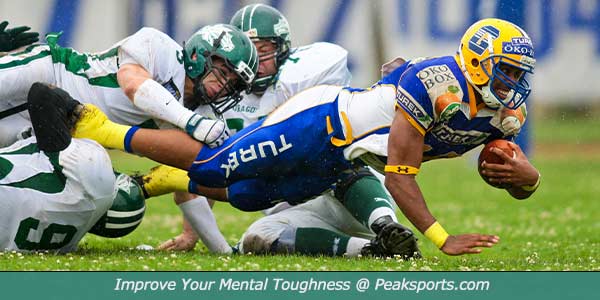
Duplicating Your Positive Mindset Daily
Have you heard the quote, “The dictionary is the only place that success comes before work.?” Legendary Green Bay Packers coach Vince Lombardi spoke those words to relate the importance of hard work.
Lombardi followed that line by saying. “Hard work is the price we must pay for success. I think you can accomplish anything if you’re willing to pay the price.”
Every athlete coach and parent knows that you need to work hard to accomplish success. However, not every athlete is willing to pay the price. Some athletes expect success without putting in the work.
“Paying the price” is a mindset that encompasses your work ethic and work habits. Many athletes have sent emails or responded to our Mental Game Surveys with a similar theme, “I work hard, but I don’t see any results.”
The “pay the price” mentality is not just about working hard sometimes. For example, at the end of a two-hour practice, your coach decides to have you and your teammates run ten wind sprints.
You are already tired. You are annoyed that your coach is making you do sprints. You think the sprints are useless. After all, you are already in good shape.
You decide just to finish practice, even though you are thinking about your plans after practice. You run the first six hard. You beat most of your teammates by a step or two.
The following two sprints, you run hard but ease into the finish. The last two, you practically jog. You think, “Who cares. Those sprints really don’t matter or affect how I perform in competition.
In this scenario, you had a mindset that “good is good enough.”
The “paying the price” mindset involves:
- Paying the price every time – Working hard in practice from start to finish.
- Paying the price in full – Giving full effort and on every drill, scrimmage, rep, set, shot, run, or routine.
- Paying the price has a mental component – Putting in the mental work to take your game higher
- Paying the price requires paying attention to the little things – Focusing on the little things makes an overall significant impact on performance.
Paying the price has a reward; it’s called improvement and success.
The Montreal Canadiens started the 2021 season, losing the first three games. You probably think, “No big deal; there are 79 more games in the season.”
True, but it is the way they lost the second game, giving up the first seven shots of the game, several odd-man rushes, and two uncontested goals in the first 18 minutes of the game.
Montreal winger Brendan Gallagher characterized the team’s effort as lazy. “We didn’t put in the work to be the team celebrating right now, he said.”
Laziness can become a habit, and your habits impact your performance. If you want to be consistent, you must be consistent in your work habits.
Developing Consistent Work Habits
One strategy to develop a strong work habit is to remind yourself to keep pushing during practice and training sessions–in order to reach your goals for the season.
Set objectives or each practice to improve your work habits and to also put in the work to improve your game.
Think back to the last practice your gave 100 percent effort… Can you duplicate that mindset and effort every day?
Related Sports Psychology Articles
- Self-Intimidation for Athletes
- How Stress Can Affect Sports Performance
- Pregame Stress and Anxiety: Athletes’ Mental Roadblock to Success
*Subscribe to The Sports Psychology Podcast on iTunes
*Subscribe to The Sports Psychology Podcast on Spotify
Download a free sports psychology report to improve your mental game!
Learn more about our one-on-one mental game coaching.
The Composed Athlete

“The Composed Athlete” is presented on 80-minute Audio Programs with a 70-page step-by-step workbook that guides you through the program each day. It’s a complete system for conditioning your mind to have maximum composure in competition.
“The Composed Athlete” was developed for any level coach, parent, or junior to professional athlete who wants to improve performance and gain a competitive edge. It does not matter if you are a fledgling junior athlete; or a seasoned professional, plagued with distractions; or you just wanting to learn how to improve your composure…
